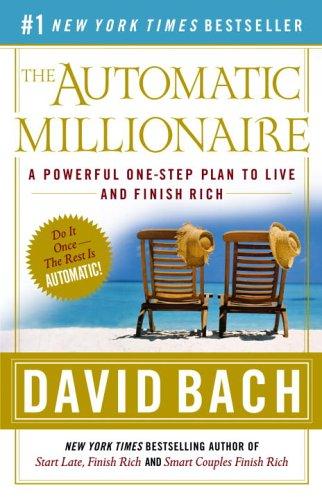Building Wealth Automatically: A Strategic Approach for Professionals
David Bach’s “The Automatic Millionaire” presents a transformative framework for achieving financial independence through automated systems. This book is not just about personal finance; it offers strategic insights that can be applied to professional development and business strategy. By examining the core principles of automation and disciplined investment, Bach provides a roadmap that aligns well with modern professional practices such as digital transformation and agile management.
Core Frameworks and Concepts
Bach’s methodology for financial success is built around a systematic approach to wealth accumulation. The book introduces readers to a series of steps that are both practical and effective:
-
Automate Your Finances: Bach emphasizes the necessity of automating savings and investment processes. By setting up automatic transfers from checking to savings or investment accounts, individuals ensure consistent contributions without the need for active management. This mirrors successful business strategies where routine tasks are automated to focus on strategic priorities.
- Example: Consider how a business automates payroll to ensure timely and accurate payments, freeing HR resources for more strategic tasks.
-
Identify the Latte Factor: This concept encourages introspection into daily spending habits to identify small, unnecessary expenses that accumulate over time. By redirecting these funds into savings, individuals can significantly enhance their financial growth.
- Example: In a business context, performing a routine audit of office supply expenditure can reveal unnecessary costs, akin to personal spending on daily coffee.
-
Pay Yourself First: This principle suggests prioritizing savings above other expenses. By treating savings as a non-negotiable “expense,” individuals develop the discipline required for wealth building.
- Example: Businesses that allocate a fixed percentage of revenue to innovation and R&D before other expenditures often outperform their peers over the long term.
-
Leverage the Power of Compounding: The earlier one starts investing, the more opportunities there are for investments to grow exponentially. This principle underscores the importance of starting early and being consistent.
- Example: A professional who invests time in learning new skills early in their career can leverage those skills for exponential career growth.
-
Strategic Financial Planning: Bach outlines the need for setting clear financial goals, budgeting, and regular review. The importance of having a strategic financial plan cannot be overstated in both personal and professional contexts.
- Example: Strategic planning in a business involves setting clear objectives, allocating resources, and periodically reviewing progress to adapt and optimize.
Key Themes
Bach’s work is rich with themes that resonate with both individuals and organizations seeking financial and strategic success. Here are key themes explored in the book:
1. Automation as a Catalyst for Growth
Bach’s emphasis on automation mirrors concepts found in “The 4-Hour Workweek” by Timothy Ferriss, which advocates for minimizing work through automation to free up time for more valuable endeavors. Just as Ferriss suggests using virtual assistants and automated systems to streamline business operations, Bach champions automatic financial systems to ensure savings and investment consistency.
2. The Behavioral Economics of Spending
The “Latte Factor” draws parallels with “Your Money or Your Life” by Vicki Robin and Joe Dominguez, which focuses on understanding the emotional drivers behind spending. Both books highlight the importance of examining spending habits to align them with long-term goals. The Latte Factor encourages a conscious reevaluation of daily spending choices to redirect funds towards meaningful investments.
3. Prioritizing Future Security
Bach’s “pay yourself first” principle is reminiscent of the advice given in “Rich Dad Poor Dad” by Robert Kiyosaki, which urges readers to prioritize building assets over liabilities. Both authors stress the importance of investing in one’s future self, whether through financial savings or acquiring income-generating assets.
4. The Power of Compounding in Various Contexts
Compounding is not only a financial concept but also a professional one. Daniel Coyle’s “The Talent Code” discusses how small, consistent efforts in skill development can lead to extraordinary achievements over time. Similarly, Bach’s focus on financial compounding demonstrates how early and consistent investment can result in substantial wealth accumulation.
5. Strategic Adaptation in a Changing World
Bach’s principles align with the ideas in “Antifragile” by Nassim Nicholas Taleb, which advocates for building systems that thrive on volatility and uncertainty. By automating finances and prioritizing strategic investments, individuals and organizations can adapt and prosper in ever-changing environments.
Final Reflection
David Bach’s “The Automatic Millionaire” provides a robust framework for achieving financial independence that transcends personal finance and extends into professional and organizational realms. By automating financial processes, identifying inefficiencies, and adopting a disciplined approach to savings, individuals and organizations can set themselves on a path to sustainable growth.
The principles Bach outlines are not isolated strategies but part of a holistic approach that aligns with broader themes in financial literature. When compared with other works such as “The 4-Hour Workweek” and “Rich Dad Poor Dad,” it becomes evident that automation and disciplined investment are universal strategies for success across multiple domains.
In a world increasingly driven by digital transformation, these principles are particularly vital. Professionals who embrace digital tools and automation can streamline their workflows, while businesses that adopt these strategies can improve efficiency and competitiveness. The synergy between Bach’s financial strategies and the principles of digital and strategic transformation offers a comprehensive blueprint for success in today’s complex landscape.
By synthesizing these insights across different domains—be it finance, professional development, or business strategy—readers can leverage Bach’s teachings to not only secure their financial future but also enhance their career and organizational growth. As we forge ahead in a rapidly evolving world, the lessons from “The Automatic Millionaire” remain a guiding light, offering clarity and direction for those seeking to build wealth and achieve lasting success.

